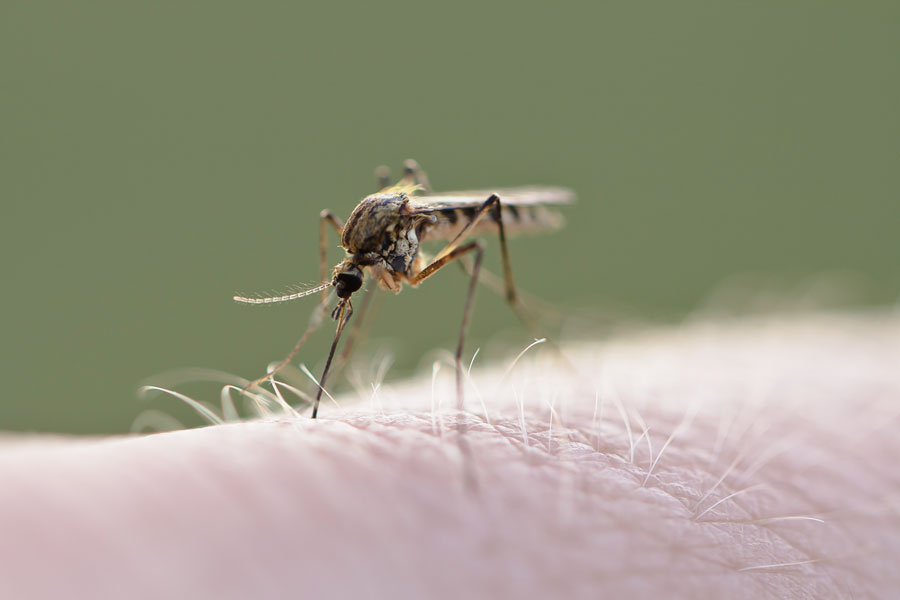Mosquitoes Test Positive For West Nile Virus In Suffolk County — Health Officials Urge Precautions

SUFFOLK COUNTY, N.Y. – Health officials are issuing a serious public health warning after fourteen mosquito samples collected across Suffolk County tested positive for West Nile virus in what is being described as a critical moment for disease surveillance and prevention on Long Island.
The samples, collected on July 16, were found in nine different locations: Nesconset, Northport, Dix Hills, Melville, Lindenhurst, West Babylon, St. James, Rocky Point, and Holtsville. All of the mosquitoes involved were from the Culex pipiens-restuans species, known to be common carriers of the virus.
The newly confirmed positives bring the county’s 2025 season total to 15 West Nile–positive mosquito samples, according to Suffolk County health officials. The spike comes amid ongoing testing across the region, which also revealed four additional mosquito pools positive for Jamestown Canyon virus, another mosquito-borne illness that poses health risks.
So far this year, there have been no confirmed human cases of West Nile virus in Suffolk County or surrounding parts of New York City. However, the virus has historically posed a serious risk to public health. In 2024, Suffolk reported 21 human infections, and in 2023, there were five cases. Since the virus first appeared in Suffolk in 1999, nine residents have died from complications associated with the disease.
The West Nile virus is primarily transmitted to humans through the bite of an infected mosquito. While most people infected do not show symptoms, a small percentage – particularly the elderly and those with weakened immune systems – can develop serious neurological complications such as encephalitis or meningitis. In some cases, the disease can be fatal.
County health officials emphasized that surveillance efforts are ongoing and that residents must take immediate steps to protect themselves. Recommendations include limiting outdoor activity between dusk and dawn, wearing long sleeves and pants, ensuring window screens are intact, and using EPA-approved mosquito repellents. Residents are also advised to eliminate standing water around their homes, which serves as mosquito breeding grounds.
Although no birds have tested positive for the virus this season, officials continue to monitor avian populations closely. Residents who spot dead birds are encouraged to report sightings to the Suffolk County Department of Health for further testing.
This recent spike in West Nile activity follows a slower start to the season. The first confirmed mosquito sample tested positive in early July in Nesconset. The large jump in positive detections over a short period has raised concerns that viral transmission could accelerate as mosquito activity increases through late summer.
The Suffolk County Health Department continues to monitor mosquito populations and perform laboratory testing as part of its regular surveillance program. Residents are urged to stay informed and take all reasonable measures to prevent bites.
In Nassau County, there have been no confirmed mosquito pools testing positive for West Nile virus in 2025 as of the most recent updates. The Nassau County Department of Health has not reported any positive mosquito detections or public health advisories related to infected mosquito samples.
New York City has detected 185 mosquito pools positive for West Nile virus—distributed across the Bronx, Brooklyn, Manhattan, Queens, and Staten Island—with the first detections as early as July 1 in 2025
West Nile Virus Outbreak – Questions & Answers
Q: What happened in Suffolk County regarding West Nile virus?
A: On July 16, 2025, 14 mosquito samples collected from nine locations across Suffolk County tested positive for West Nile virus. This brings the county’s total to 15 positive samples so far this season.
Q: Where exactly were the positive samples found?
A: The infected mosquitoes were collected in Nesconset, Northport, Dix Hills, Melville, Lindenhurst, West Babylon, St. James, Rocky Point, and Holtsville.
Q: Has anyone in Suffolk County gotten sick from West Nile virus this year?
A: As of the latest reports, there have been no confirmed human cases of West Nile virus in Suffolk County in 2025.
Q: How dangerous is West Nile virus?
A: While most people infected do not show symptoms, about 1 in 5 may develop mild symptoms such as fever, fatigue, and body aches. In rare cases (less than 1%), the virus can cause severe neurological illness or even death, especially in older adults or those with weakened immune systems.
Q: How does West Nile virus spread?
A: The virus spreads to humans through the bite of an infected mosquito, typically after the mosquito feeds on an infected bird. It cannot spread from person to person.
Q: What is being done to monitor the outbreak?
A: Suffolk County conducts regular mosquito surveillance, testing for both West Nile virus and Jamestown Canyon virus. The health department is also encouraging the public to report dead birds and eliminate standing water where mosquitoes can breed.
Q: What steps can I take to protect myself and my family?
A:
- Avoid outdoor activities between dusk and dawn, when mosquitoes are most active
- Wear long sleeves, pants, and socks
- Use insect repellent containing DEET or other EPA-approved ingredients
- Ensure windows and door screens are intact
- Empty standing water from containers such as buckets, birdbaths, flower pots, and gutters
Q: What is Jamestown Canyon virus, and is it also a concern?
A: Yes. In addition to the West Nile virus detections, Suffolk County has also confirmed four mosquito pools that tested positive for Jamestown Canyon virus. Like West Nile, it is transmitted by mosquitoes and can cause flu-like symptoms or, in rare cases, more serious illness.
Q: Has Suffolk County dealt with outbreaks like this before?
A: Yes. West Nile virus has been detected in Suffolk County every year since 1999. In 2024, there were 21 confirmed human cases. The virus remains a seasonal threat during the summer and early fall months.
Q: Is there a vaccine or treatment for West Nile virus?
A: There is no vaccine or specific antiviral treatment for West Nile virus in humans. Medical care is supportive and based on symptoms. Severe cases may require hospitalization.
Q: How widespread is West Nile virus among mosquitoes in New York City in 2025?
A: As of July 2025, neighboring New York City has reported 185 mosquito pools testing positive for West Nile virus, with detections across all five boroughs – The Bronx, Brooklyn, Manhattan, Queens, and Staten Island. The first positive samples were identified in early July, indicating active and widespread circulation of the virus in the region this summer.


